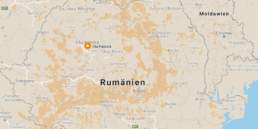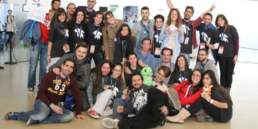
Marcus Khoury has been one of the most active people in AEGEE. President of AEGEE-Köln, HRWG president and CD member are just few of his activities. Mostly he is remembered as very kind and always enthusiastic person. Marcus told the Golden Oldie about his new life in Abu Dhabi.
Golden Oldie: Marcus, you have a very interesting family background. Can you briefly describe it?
Marcus Khoury: My mother is German and my father is Lebanese. I was born in Beirut, lived for a while in suburbs of Washington D.C. when I was ten years old and moved to Germany when I was 13 years old. I studied law both at universities of Köln, Germany, as well as Paris, France, and then moved to München, Bavaria.
Golden Oldie: When did you join AEGEE?
Marcus Khoury: I first joined AEGEE in 1993 in Köln and was involved in organising the conference on “Europe and the Islamic Cultures”.
Golden Oldie: Which of the many things you did in AEGEE do you remember with the best memories?
Marcus Khoury: My term in the CD of AEGEE-Europe and the Agora Barcelona in which we presented our candidature. Those were excellent and exciting times. Attending my first Unesco meeting in Paris for which I hitchhiked in jeans to Brussels, had a coffee early in the morning in the cafe opposite of Unesco, to go and change in the men’s room and get out in a dashing black suit. Also, the conference on “Europe and the Islamic Cultures”, because it was my very first international AEGEE event. It was a matching initiation for an exhilarating experience, the first of many domino stones in an ongoing chain reaction of travelling, making friends and meeting friends until now and beyond. Also a great memory: meeting Nobel Peace Prize Winner Jose Ramos Horta as member of the Human Rights Working Group at a conference in Brussels on East Timor.
Golden Oldie: Your are lawyer and mostly worked abroad. Why?
Marcus Khoury: I always wanted to travel, discover new cities and countries and not limit these experiences to my studies or in my professional life to my vacation. As a matter of fact, I never worked in Germany after passing the bar exam. However, it may be difficult to explain the term “abroad”, since it always implies “abroad from somewhere”. Yet from where, is what is actually nearly impossible.
Golden Oldie: What are you working now?
Marcus Khoury: I am head of the Legal Department of a Saudi-Lebanese construction company in the United Arab Emirates. We have two entities here dealing with contracting and facilities management, one in Abu Dhabi and another in Dubai. I commute a lot between the two cities and spend on average one to two days a week in Dubai and the rest in Abu Dhabi.
Golden Oldie: In the past decade your life circled around the Arabic peninsula. You were in Dubai, Saudi-Arabia and now in Abu Dhabi. Which of these places do you like best, which least?
Marcus Khoury: This may sound like a very constructed diplomatic answer, but it is sincere: all places were right at the right time. I was first in Dubai in 2001. It was a crazy time. I was still in my legal training and free of any personal responsibilities. It was still during the boom time of Dubai. One project crazier than the other was being announced day by day. The seven star hotel, Burj al Arab, had just been completed.
Golden Oldie: How did you experience that time?
Marcus Khoury: We worked like crazy and then right after work partied even more. It was the right time because so much has changed now. I remember attending the launching party of Time Out Dubai Magazine in the Hard Rock Cafe in the middle of the desert on the highway from Dubai to Abu Dhabi. The area is now no longer a desert, it has become the new commercial centre of Dubai, the venue lost its liquor license, lost its name and is now an empty ruin of a tiny house with an oversized guitar at the entrance right next to the highway, dwarfed between giant skyscrapers, whereas it used to be this exciting venue that was almost like a tempting lighthouse you only reached at night after driving miles through the desert. Its a strange feeling, a tinge of nostalgia and goose-bumps when I pass by it today. Then in 2001 came September 11.
Golden Oldie: How did the terrorist attack change the atmosphere?
Marcus Khoury: The non-stop rhythm between work and party suddenly stopped or was put on hold. It was just as bizarre. It gave you a feeling of these British movies of post-colonial times, like when the pseudo-elite in Kenya, or at least that is how they considered themselves, suddenly had to pack their bags say good-bye to it all and return to their supposedly gray and dreary, rainy hometowns. That is how it felt like in autumn 2001, gone were the Monaco-style parties and expats were worried about the effects of a war in Afghanistan on Dubai, were already packing their bags in their mind or even gone back to Europe and wondering how they would cope back home in their two-bedroom apartment instead of the posh villa at the beach without the maid, the gardener, the driver and the nanny, which all seemed to cost almost nothing here, but were just not affordable back home.
Golden Oldie: And you were leaving, too?
Marcus Khoury: I even remember the very evening I left Dubai in 2001, I was supposed to fly with Swiss Air and the company had such financial problems that actually all flights were cancelled. I flew on some desperate “return all staff from Abu Dhabi to Switzerland flight” back to Zurich, and faced the havoc of hundreds of people just lost at the airport. It couldn’t have been a stranger ending to my first chapter in the Gulf.
Golden Oldie: When you returned, it was a different time and a different country. How was Saudi-Arabia?
Marcus Khoury: Saudi Arabia was very different. It was so different that it initially appeared exciting and adventurous. A rigid country with strict rules that have been applied since the earliest Middle Ages. Every restaurant outside of an international hotel, from a posh place all the way down to a fast food joint, would have a single zone, meaning for the men, and a family zone, meaning for the men with their wives or daughters. It was really interesting to witness how in spite of all modern society, internet and satellite TV, a society still tried to withstand what is appearing to become a global every-day culture.
Golden Oldie: And then the initial excitement wore off?
Marcus Khoury: Whatever appeared so interesting in the beginning turned nerve-racking to the end. I began to notice that I was actually turning more intolerant than I had been before I came. I was disgruntled by what appeared to me as hypocrisy – the rules everybody claimed to abide by in public and the flagrant abundance, by which the same rules were broken in private.
Golden Oldie: Do you regret that you went there?
Marcus Khoury: No, I do not regret having gone there at all. In spite of it all I do actually have the Saudis in memory as a very friendly, very hospitable, and very forthcoming people. While waiting for a taxi at the boardwalk, it could happen to you that a general manager of a company would stop in his limo and drop you off wherever you were planning to go. I remember going camping at night in the desert, seeing a jungle of stars not disturbed by any artificial light apart from far away fires of other campers slightly hidden between dunes, running away from scorpions, and packing myself in camel hair blankets to withstand the cold.
Golden Oldie: So how does your new home, Abu Dhabi fit in?
Marcus Khoury: Abu Dhabi is very different. It is less rigid than Saudi Arabia, yet more traditional than Dubai. It took me a while to get used to seeing women behind the steering wheel again – women are still not allowed to drive in Saudi Arabia. Or even to seeing women walk alone on the street – women usually have to be accompanied by their fathers, brothers or husbands when they leave their homes in Saudi Arabia. But just as Abu Dhabi has this plan to attract less mass tourism and to focus on culture and sports, I may also have begun to be less keen on going to these wild parties as back in Dubai anyway, but still enjoy a Bollywood movie on a Friday afternoon in the cinema. Cinemas theatres are also generally still forbidden in Saudi Arabia.
Golden Oldie: Is it easy to make friends in Abu Dhabi? What’s the best strategy to get to know people?
Marcus Khoury: I would not say it is difficult. Like in every city the challenge is finding the right balance between work and personal life. I wouldn’t call it a strategy, it is always a combination of luck, circumstance and intention. I made friends through work, who introduced me to their friends and these again to their friends.
Golden Oldie: How do you spend weekends?
Marcus Khoury: Weekends are sometimes spent at home, chilling after a stressful week at work, watching movies in the cinema, brunching with friends, or going out camping with them. I want to start travelling more in the area and benefit from my presence here to see more of the neighbouring cities and countries.
Golden Oldie: How do locals and guest workers get along?
Marcus Khoury: That is a tough question. Mainly because there is not just one category of guest worker. The expat can be anyone from a taxi driver from Pakistan to a general manager from the United States or the United Kingdom. You may notice how certain nationalities are more common in one job category than another, but also this is mixing gradually. It is still unlikely to meet a janitor or caretaker of a house with a Canadian passport, whereas these could largely be Indian or Bangladeshi. A nurse is likely to come from the Philippines. In the past, such as when I first lived in Dubai, there was this pre-conception among expats that locals looked down on the expat workers and would give themselves privileges even in every-day life matters. Now, contrary to Saudi Arabia, the Emiratis are literally a minority in their own country, less than 20 percent, slowly taking over certain position in the working world, but it is still average to have a judge who is from Egypt, a traffic police officer who is from Yemen, a civil servant at the Municipality who is from Sudan. You hardly meet with locals on a daily basis.


